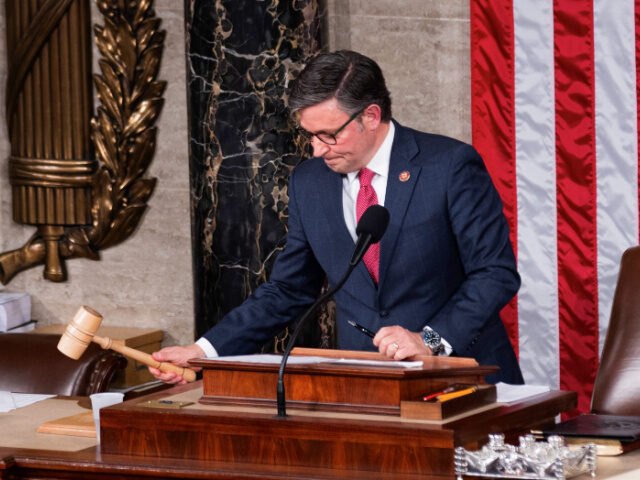Speaker Mike Johnson (R-LA) on Tuesday reportedly tabled a move to slip a deep state reauthorization into a defense bill.
“BREAKING NEWS —@SpeakerJohnson has nixed an extension of FISA authority as part of the NDAA,” Punchbowl News’s Jake Sherman wrote.
As Breitbart News has reported, Johnson and other congressional leaders have wanted to temporarily reauthorize Section 702 of the Foreign Intelligence Surveillance Act (FISA) in the National Defense Authorization Act (NDAA). Section 702 is a controversial government surveillance law, and the proposed move received strong backlash from 54 bipartisan House lawmakers and House Judiciary Committee Chairman Jim Jordan (R-OH).
At one point, Johnson’s office refused to confirm to Breitbart News Rep. Matt Gaetz’s (R-FL) claim that there would be no reauthorization, temporary or otherwise, of Section 702.
Johnson said that they would allow for the different Section 702 fixes to be considered on the House floor:
During a closed-door conference meeting on Tuesday, Johnson said that he could bring Jordan’s and Turner’s two competing bills up for a vote in a rare procedural gambit known as “King of the Hill” if there isn’t a consensus over Section 702, according to two Republicans in the room. Under that gambit, leadership can bring competing proposals to the floor as amendments, and whichever proposal is the last one that comes up for a vote and still gets a majority is the one that gets adopted. It allows leadership to try to influence the outcome by putting its preferred proposal last.
As recently as Tuesday, Sen. Ron Wyden (D-OR), who cosponsored the Government Surveillance Reform Act with Sen. Mike Lee (R-UT) to rein in Section 702, opposed an extension in the NDAA.
“We’re going the distance with reform. Business as usual is not going to be acceptable. When I started, it was pretty lonely. You could have meetings about 702 reform operations in a couple of phone booths. And I’m looking around now and I’m seeing a lot of allies,” Wyden said, noting that he does not see how a clean authorization could have been possible with the strong bipartisan opposition to such a move.
As Johnson and other congressional leaders no longer wish to include Section 702 in the NDAA debate, the Judiciary Committee will now consider the merits of their proposal to rein in the controversial surveillance law.
The Protect Liberty and End Warrantless Surveillance Act (PLEWSA) would require a warrant for any Americans’ information sought under Section 702. The program does not currently require a warrant for such a search.
The legislation would also prohibit law enforcement and intelligence agencies from purchasing Americans’ private data through data brokers, a practice which has been known as the “data broker loophole.” Biggs and other lawmakers have decried this practice, believing it to be a run around the Fourth Amendment.
Watch — Rep. Andy Biggs: CDC Purchased $420k Worth of Data to Surveil Americans During the Coronavirus Pandemic
Video Source: U.S. House of RepresentativesThe Judiciary bill would also limit how many FBI agents can search the Section 702 database and would set up penalties for violations under FISA.
Reps. Andy Biggs (R-AZ), Jim Jordan (R-OH), Jerry Nadler (D-NY), Pramila Jayapal (D-WA), Warren Davidson (R-OH), Sara Jacobs (D-CA), and Russell Fry (R-SC) sponsored the legislation.
Biggs said in a written statement:
America’s intelligence community continues to conduct a warrantless, mass surveillance campaign on innocent citizens. In 2021 alone, the FBI misused FISA 278,000 times to spy on American citizens – including a U.S. congressman and political donors. Our civil liberties are at stake. Without serious reforms to FISA 702, our Fourth Amendment rights will be all but gone. My legislation addresses numerous loopholes in federal law to end this unconstitutional practice and to ensure rogue agents are held accountable. I am grateful for the bipartisan, bicameral effort to overhaul the FISA 702 spying authority. I call on my colleagues to pass this legislation into law.
Jordan also addressed the subject in a written statement:
Substantial reforms to FISA are long overdue, and we commend Chairman Biggs for his steadfast commitment to reining in unchecked surveillance of Americans. The House has never been in a better position to pass sweeping and much-needed reforms, and we look forward to the Protect Liberty and End Warrantless Surveillance Act’s consideration in the Judiciary Committee.
Privacy-oriented groups such as Americans for Prosperity, FreedomWorks, Demand Progress, and others back the legislation.
“The Protect Liberty and End Warrantless Surveillance Act is a significant step forward to restoring the right to privacy,” Davidson wrote. “This legislation prohibits the government from purchasing Americans’ data from big tech companies without a search warrant and adds needed warrant requirements to Section 702 of FISA. Our constitution is not for sale and the right to privacy must be protected.”
Sean Moran is a policy reporter for Breitbart News. Follow him on Twitter @SeanMoran3.

COMMENTS
Please let us know if you're having issues with commenting.